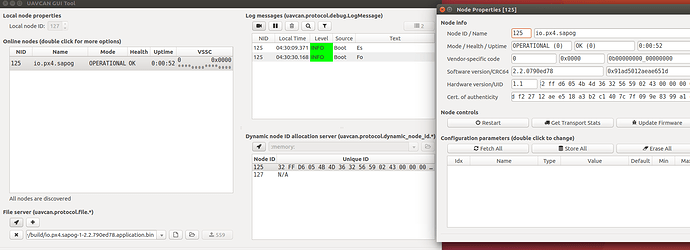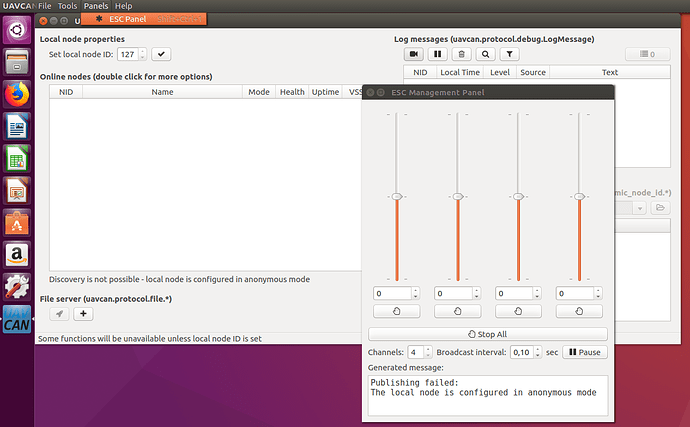As per readme, you should use GCC 4.9. Some newer versions work as well.
Thanks.
I used GCC 4.3.9 and also used GCC 6.3.1. But I still get error.
I do not know what’s wrong if the version is not a problem.
You should use GCC 4.9, not 4.3. Also, what operating system you’re on?
Sorry. I wrote a mistake. I use 4.9, not 4.3. and ubuntu 16.04.9.
As written on the ‘Zubax Knowledge Base’, I installed the following components:
- Full-featured Ubuntu-based OS with KDE desktop.
- ARM GCC Embedded toolchain.
- Core development tools (git, make, cmake, etc.).
- Full LaTeX distribution (texlive-full).
- Eclipse IDE.
Okay, this looks right and it should work. Are you using an AMD64 system? Is the OS installed on your hardware natively, or are you using a virtualized environment? Can you try GCC 7? Please also post the output of uname -a.
I’ve seen a similar report in the past, but I was never able to reproduce it. It just works on all machines that I have access to.
Thanks Pavel.
I am using on AMD64 system. OS is installed on my hardware natively.
At first, I used GCC 7. But I faced bug that is reported GNU web site. So I changed it to GCC 6.3.1.
The following is the output of uname -a.
Linux spacl4-To-be-filled-by-O-E-M 4.13.0-36-generic #40~16.04.1-Ubuntu SMP Fri Feb 16 23:25:58 UTC 2018 x86_64 x86_64 x86_64 GNU/Linux
I just re-checked everything. The code compiles perfectly well on my Mint 18 (based on Ubuntu 16.04), both on my PC and on a virtual machine (this one: Bistromathic virtual machine - Knowledge Base - Zubax Knowledge Base), using GCC 6.3 and GCC 4.9. Note that other versions of GCC may only work if the compiler version check at the end of main.cpp is removed: sapog/main.cpp at 790ed7881dd40e43b09501d7a9ffb6e7020d0668 · PX4/sapog · GitHub
To be honest I have no clue what is going on. Perhaps you should send a bug report to GCC maintainers? For now, consider using the virtual machine I linked above.
Thanks.
I re-install OS and other components. Also I removed the compiler version check at the end of main.cpp. Then the code compiles well using GCC 6.3.1.
Thank you for checking everythig.
Hello.
I’m having trouble uploading. I got a result as below.
~/software/new/sapog/tools$ ./blackmagic_flash.sh /dev/ttyACM0
text data bss dec hex filename
139832 11078 43580 194490 2f7ba compound.elf
fwupload.tempfile:1: Error in sourced command file:
/dev/ttyACM0: permission denied.
(Or) /dev/ttyACM0: no such file or directory.
I tried several things to solve it and it failed. Now, I have no idea. How can I fix it?
Thanks.
I already see that. I have another question. Do I apply power to Orel 20 before powering the blackmagic probe? Is the order of power supply important? Because I got this:
~/software/origin/sapog/tools$ ./blackmagic_flash.sh /dev/ttyACM0
text data bss dec hex filename
139816 11078 43572 194466 2f7a2 compound.elf
Target voltage: 0.0V
SW-DP scan failed!
fwupload.tempfile:3: Error in sourced command file:
Attaching to Remote target failed
Normally you should power the debugger first. The error could be caused by a faulty connector.
I have to wait until new debugger arrives. So I want to change the method if it is certain that it is due to a failure. you said that
If you don’t have any of the above, you could use the embedded UAVCAN bootloader via the UAVCAN GUI Tool 4.
https://forum.zubax.com/t/sapog-esc-flashing/864/2?u=binns
Can I upload ‘compound.elf’ via the UAVCAN GUI Tool ?
Nope, you need a flat binary for that. It is named *.application.bin
I have a flat binary named *.application.bin. Then how can I upload that via UAVCAN GUI Tool? Please let me know or leave a reference page.
We don’t have a ref page for that, but it’s easy: just double-click on the node in the GUI Tool, and you’ll see a new window pop up. In the window, click “Update Firmware”.
Thanks.
I solved the problem. At last, I want to operate ESC Management Pannnel on UAVCAN GUI Tool. Unlike in Windows, I can’t open it in Ubuntu. Do I have to run another command in the terminal window?
It should work in Ubuntu equally well. Could you please clarify what exactly is not working?

